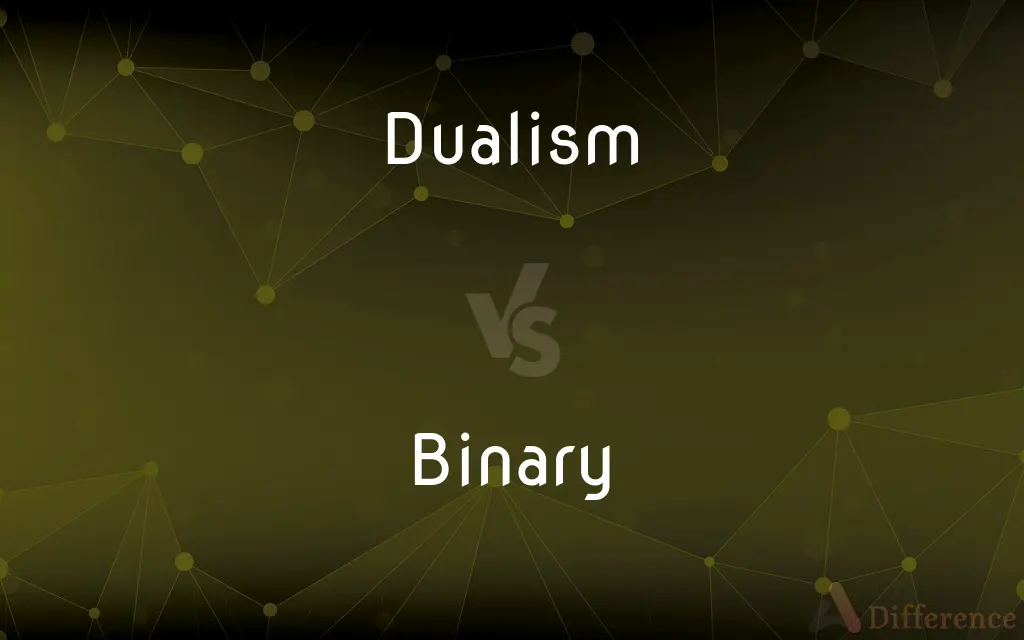Dualism vs. Binary — What's the Difference?
By Tayyaba Rehman & Maham Liaqat — Updated on March 11, 2024
Dualism refers to the philosophical concept of two fundamental principles (often mind and matter) being distinct and often opposed, while binary describes a system or classification involving two parts, states, or categories.

Difference Between Dualism and Binary
Table of Contents
ADVERTISEMENT
Key Differences
Dualism, in philosophy, posits a clear separation and opposition between two fundamental aspects of reality, such as the mental and the physical, or the good and the evil. Binary, on the other hand, pertains to a classification system or structure that divides concepts, values, or objects into two contrasting categories, such as on/off or true/false.
Dualism often involves deeper metaphysical considerations, suggesting that the two principles it identifies cannot be reduced to one another or explained by a more fundamental unity. Binary, however, is more about practical distinction and operational logic, especially evident in computing where binary code represents data through a series of 0s and 1s.
The concept of dualism can apply to a wide range of philosophical, religious, and cultural beliefs, highlighting a worldview that sees the universe as governed by two opposing forces. Binary systems, while they can be used to describe philosophical or cultural dichotomies, are most commonly associated with the practical applications in mathematics, computer science, and logic.
Dualism challenges the notion of a singular essence of existence, advocating for the recognition of two equally important, but fundamentally different, aspects of reality. Binary, while it can reflect dualistic thinking in its division, tends to focus on the method of categorization or representation rather than the philosophical implications of the division itself.
In discussions of mind and consciousness, dualism argues for a distinction between the mind (or soul) and the body, a view that has significant implications for debates on the nature of consciousness and personal identity. In contrast, binary structures in thought or logic do not inherently carry implications about the nature of reality but are tools for organization and understanding.
ADVERTISEMENT
Comparison Chart
Definition
A philosophical concept emphasizing two fundamental and often opposed principles.
A system or classification involving two parts, states, or categories.
Application
Philosophy, religion, ethics.
Computing, logic, mathematics.
Focus
Metaphysical distinctions between two aspects of reality.
Practical distinction and operational logic.
Examples
Mind vs. body, good vs. evil.
On/off, 1/0 (binary code).
Implications
Suggests complexity and depth in the nature of existence.
Reflects a method of organization or operation without inherent metaphysical claims.
Compare with Definitions
Dualism
Found in various philosophical and religious traditions.
Cartesian dualism separates the realm of the mind from that of the material world.
Binary
Can denote simple on/off mechanisms or choices.
Thermostats often operate on a binary system for heating or cooling.
Dualism
Suggests non-reducible aspects of reality.
In dualism. consciousness is irreducible to physical processes.
Binary
Central to computing and digital logic.
Binary code uses combinations of 0s and 1s to represent information.
Dualism
The belief in two fundamentally opposed principles.
Dualism explores the dichotomy between mind and body.
Binary
Used in mathematics to describe base-2 number system.
Binary arithmetic is fundamental to the operation of computers.
Dualism
Influences debates on nature of existence.
Dualism raises questions about the relationship between physical and spiritual realms.
Binary
Involves two contrasting categories or states.
Binary oppositions structure many cultural narratives and myths.
Dualism
Applies to metaphysical and ethical distinctions.
Dualistic religions often contrast forces of good and evil.
Binary
Reflects dichotomy without metaphysical depth.
Binary thinking can simplify complex issues into black and white.
Dualism
The condition of being double; duality.
Binary
Relating to, composed of, or involving two things.
Dualism
(Philosophy) The view that the world consists of or is explicable as two fundamental entities, such as mind and matter.
Binary
Relating to, using, or denoting a system of numerical notation that has 2 rather than 10 as a base.
Dualism
(Psychology) The view that mental and physical properties are fundamentally different and that neither can be explained fully in terms of the other.
Binary
The binary system of notation
The device is counting in binary
Dualism
The concept that the world is ruled by the antagonistic forces of good and evil.
Binary
Something having two parts.
Dualism
The concept that humans have two basic natures, the physical and the spiritual.
Binary
Characterized by or consisting of two parts or components; twofold.
Dualism
Duality; the condition of being double.
Binary
Of or relating to a system of numeration having 2 as its base.
Dualism
(philosophy) The view that the world consists of, or is explicable in terms of, two fundamental principles, such as mind and matter or good and evil.
Binary
Of or relating to a system of encoding data using only 0's and 1's.
Dualism
(theology) The belief that the world is ruled by a pair of antagonistic forces, such as good and evil; the belief that man has two basic natures, the physical and the spiritual.
Binary
(Chemistry) Consisting of or containing only two kinds of atoms.
Dualism
The theory, originated by Lavoisier and developed by Berzelius, that all definite compounds are binary in their nature, and consist of two distinct constituents, themselves simple or complex, and having opposite chemical or electrical affinities.
Binary
Of or employing two comparatively nontoxic chemicals that combine to produce a deadly poison
Binary weapons.
A binary nerve agent.
Dualism
State of being dual or twofold; a twofold division; any system which is founded on a double principle, or a twofold distinction
An inevitable dualism bisects nature, so that each thing is a half, and suggests another thing to make it whole.
Binary
(Music) Having two sections or subjects.
Dualism
The doctrine that reality consists of two basic opposing elements, often taken to be mind and matter (or mind and body), or good and evil
Binary
A number system having 2 as its base.
Binary
A file that contains the executable version of a computer program.
Binary
A binary star.
Binary
Being in one of two mutually exclusive states.
Binary states are often represented as 1 and 0 in computer science.
Binary
(logic) Concerning logic whose subject matter concerns binary states.
Binary
Concerning numbers and calculations using the binary number system.
Binary
Having two equally important parts; related to something with two parts.
Binary star
Two ingredients are combined in a binary poison.
A binary statistical distribution has only two categories.
Binary
Of an operation, function, procedure, or logic gate, taking exactly two operands, arguments, parameters, or inputs; having domain of dimension 2.
Division of reals is a binary operation.
Binary
(computing) Of data, consisting coded values (e.g. machine code) not interpretable as plain or ASCII text (e.g. source code).
Plain text
He downloaded the binary distribution for Linux, then burned it to DVD.
Binary
(comparable) Focusing on two mutually exclusive conditions.
He has a very binary understanding of gender.
Binary
A state in which only two values are possible, in which something must have one value or the other.
Binary
The bijective base-2 numeral system, which uses only the digits 0 and 1.
Binary
(computing) binary file; a file consisting of data other than human-readable text.
Binary
(astronomy) binary star.
Binary
Compounded or consisting of two things or parts; characterized by two (things).
Binary
That which is constituted of two figures, things, or parts; two; duality.
Binary
A system of two stars that revolve around each other under their mutual gravitation
Binary
Of or pertaining to a number system have 2 as its base;
A binary digit
Binary
Consisting of two (units or components or elements or terms) or based on two;
A binary star is a system in which two stars revolve around each other
A binary compound
The binary number system has two as its base
Common Curiosities
Is dualism applicable outside of philosophy?
Yes, dualism can apply to religious, ethical, and cultural beliefs, where it denotes a worldview of two opposing forces or principles.
How does dualism differ from binary thinking?
Dualism deals with metaphysical distinctions between two aspects of reality, suggesting depth and complexity, while binary thinking is about practical division and lacks inherent metaphysical implications.
Can binary systems be considered dualistic?
Binary systems can reflect dualistic thinking in their division into two categories, but they are primarily practical tools and do not engage with the philosophical implications of dualism.
How do dualism and binary concepts influence human thought?
Dualism influences human thought by suggesting complex, often spiritual distinctions in reality, while binary concepts provide a framework for understanding and organizing information through dichotomy.
What is an example of a binary system?
An example of a binary system is binary code in computing, where data is represented through a series of 0s and 1s.
What are the criticisms of dualism?
Criticisms of dualism include challenges to the sharp division it posits, especially in the mind-body problem, and the difficulty of explaining interaction between two fundamentally different realms.
What does binary mean?
Binary refers to a system, classification, or structure that is divided into two parts, states, or categories.
Can dualism and binary coexist in a philosophical framework?
Yes, dualism and binary can coexist; dualism provides a metaphysical perspective on the nature of reality, while binary structures can be used to organize those dualistic elements practically.
What is dualism?
Dualism is a philosophical stance positing that there are two basic, fundamentally different, and often opposed principles governing reality.
Why is binary thinking important in computing?
Binary thinking is crucial in computing because it provides a simple, efficient way to process and store information, enabling the functioning of digital technology.
Share Your Discovery

Previous Comparison
Console vs. Portal
Next Comparison
Extrados vs. IntradosAuthor Spotlight
Written by
Tayyaba RehmanTayyaba Rehman is a distinguished writer, currently serving as a primary contributor to askdifference.com. As a researcher in semantics and etymology, Tayyaba's passion for the complexity of languages and their distinctions has found a perfect home on the platform. Tayyaba delves into the intricacies of language, distinguishing between commonly confused words and phrases, thereby providing clarity for readers worldwide.
Co-written by
Maham Liaqat













































